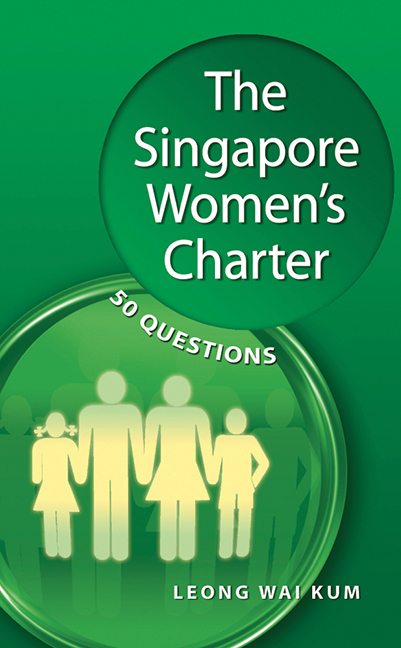Book contents
- Frontmatter
- Contents
- List of Questions
- Foreword
- Preface
- Part I What is the Women's Charter?
- Part II Marriage
- Part III Regulation of Husband-Wife Relationship
- Part IV Regulation of Parent-Child Relationship
- Part V Violence in the Family
- Part VI Divorce and the Process
- Part VII Maintenance
- Part VIII Division of Matrimonial Assets
- Part IX Muslims
- Epilogue
- References
- Index
- About the Author
Part III - Regulation of Husband-Wife Relationship
Published online by Cambridge University Press: 21 October 2015
- Frontmatter
- Contents
- List of Questions
- Foreword
- Preface
- Part I What is the Women's Charter?
- Part II Marriage
- Part III Regulation of Husband-Wife Relationship
- Part IV Regulation of Parent-Child Relationship
- Part V Violence in the Family
- Part VI Divorce and the Process
- Part VII Maintenance
- Part VIII Division of Matrimonial Assets
- Part IX Muslims
- Epilogue
- References
- Index
- About the Author
Summary
What is the approach of the Women's Charter towards regulating the relationship between husband and wife?
The husband and wife are both at least eighteen years old going into the marriage. Most people marry later so the vast majority of husbands and wives, even at the point of their marriage, are already adults. The approach that the Women's Charter should and does take towards regulating their relationship is one of minimal intervention. The Women's Charter permits them to organize their lives together in any way that suits them.
The Women's Charter first sets out its expectations of the way a husband and wife will treat each other and steers them towards a reasonable view of what it means to be married to each other. This the statute achieves through the provision that provides a moral view of marriage as being an equal cooperative partnership of different efforts (discussed in Question 13 below). Then the Women's Charter fairly much leaves the husband and wife to their own devices.
The statute intervenes in their relationship only when it is absolutely necessary to do so. This is when either the husband or the wife falls so far short of what the law expects of him or her that it becomes necessary for the law to step in. Where violence is committed or threatened among family members (discussed in Part V below) is one clear instance. Where a husband fails to provide reasonable maintenance to his wife who is dependent on his financial support is another instance (discussed in Part VII below). The aim is thus as little intervention as possible. Only then can the continuing deep relationship between a husband and wife grow stronger within the privacy that non-legal intervention provides a couple.
What does the equal cooperative partnership of different efforts mean?
Section 46(1)
The Women's Charter in section 46(1) provides that upon the solemnization of marriage a husband and wife are mutually bound to cooperate with each other in safeguarding the interests of the union. The provision continues to state that they shall have equal rights in the running of the matrimonial household, they shall have the right separately to engage in any trade or profession or social activities, and that a wife shall have the right to use her own surname and name if she chooses to.
- Type
- Chapter
- Information
- The Singapore Women's Charter50 Questions, pp. 25 - 38Publisher: ISEAS–Yusof Ishak InstitutePrint publication year: 2011



